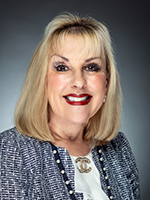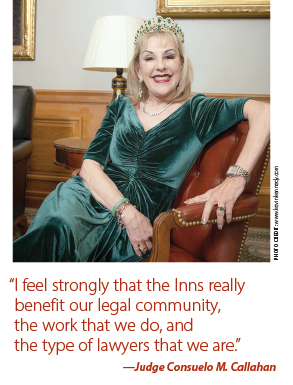The Bencher | September/October 2024
Judge Consuelo M. Callahan
President, American Inns of Court
By Melanie Padgett Powers
 Judge Consuelo M. Callahan hated law school. But she learned to love the law and to embrace how the law can help improve society and set an example for communities. Callahan, a judge on the U.S. Court of Appeals for the Ninth Circuit (California), is the new president of the American Inns of Court.
Judge Consuelo M. Callahan hated law school. But she learned to love the law and to embrace how the law can help improve society and set an example for communities. Callahan, a judge on the U.S. Court of Appeals for the Ninth Circuit (California), is the new president of the American Inns of Court.
Callahan grew up in Northern California as the oldest of three. Her father was a Spanish teacher from San Francisco, and her mother was a stay-at-home mom whose family was from Spain. Callahan remembers her father going back to school to earn his master’s and doctorate in education. “I didn’t feel pressure to do well in school,” Callahan says, “but I felt an emphasis on education and supportiveness there.”
She calls her mom an “early feminist,” recognizing that her mother went from living with her father to being married and not being able to financially support herself. She didn’t want that for her daughters, telling them often: “You need to have a good job. You need to be able to take care of yourself if you want to have choices.”
Callahan’s father also supported his daughters’ education. “He was kind of a girl dad in the sense that if you said you wanted to do something, he just said, ‘Well, why aren’t you doing it?’ He was a very ‘can do’ kind of person.”
That focus on education and supporting oneself led Callahan to law school at a time when not many women were there. She studied hard in high school, was involved in many extracurricular activities, and became salutatorian. “I feel that part of the reason that I’ve been able to work as long as I have in life is that I was able, in those years, to develop the kind of qualities that you need for resilience and stamina, as opposed to burning out at an early age.”
Callahan was an English major at Stanford University, but thought the law offered more opportunities. But she hadn’t yet developed a passion for the law. “I wanted to have my own career. I wanted to be able to support myself, and I wanted to have a job that would give me autonomy. And law seemed to fit the bill.”
But law school was rough. With fewer than 10 women in her class, she faced sexism—but there were also no women mentors, and the curriculum itself was difficult. It was the first time she thought she could fail at something.
“It was always my goal to be there, but once I got there, I felt like I’d reached my goal,” she says. “Everyone was either the valedictorian or the salutatorian of their class. I looked around and thought, ‘Well, they’re just like I am or they’re smarter than I am. I can’t be No. 1 anymore.’”
But after she survived the first year, she told herself, “I will never let anyone make me feel this way again.” Callahan persevered.
Creating Her Own Career Path
After graduating law school in 1975 and passing the bar, Callahan went job hunting, not knowing what direction she wanted to go in. A friend told her that the city attorney of Stockton, California, was looking to hire a deputy city attorney and that his wife—a fellow Stanford grad—wanted him to hire a woman. “That wasn’t a job I wanted, but I needed a job,” Callahan says. “I knew at that point that I wanted to be a trial lawyer.”
She got the job but also applied to the county for an attorney position. At the time, it was one list for both the district attorney’s (DA) office and the public defender’s office. After 10 months as deputy city attorney, she says, “The DA offered me a job the day before the public defender did, and I accepted it. Probably, if it had been the other way around, I would have been a public defender.”
She was one of only three women in the DA’s office—and the other two women were older, second-career attorneys. But her male boss became a mentor, giving her cases to try. She didn’t lose any of her first 20 cases.
Later, Callahan created the first child abuse and sexual assault unit in the office, which was rare at that time. “They were very difficult cases, and the DA’s office wasn’t very successfully prosecuting sexual assaults and child abuse cases. So, I was at the forefront of that. And it made me an even better trial lawyer. I started pushing the envelope in trying cases that hadn’t been prosecuted before, qualifying younger children to be witnesses, trying rape cases.”
Callahan began to set her sights on being a judge. After she was not appointed to a judicial position, she applied and became a commissioner on the Stockton Municipal Court in 1986—the first women court commissioner in the county. Six years later, she was appointed to the San Joaquin County Superior Court—the first woman and first Latina on the court.
She continued upward, being appointed four years later to the Third District California Court of Appeals—the first time someone went from the San Joaquin County Superior Court to the appeals court in 73 years.
In 2003, Callahan was nominated by President George W. Bush to serve on the U.S. Court of Appeals for the Ninth Circuit. The Senate confirmed her 99–0.
“It was not my goal in life to be a federal judge; I took a detour,” says. “My goal in life, as I progressed through the judiciary, was to be on the California Supreme Court. … It was a total surprise to me when the White House counselor contacted me and wanted to talk to me about the U.S. Court of Appeals for the Ninth Circuit.”
Goals as Inns President
 While Callahan was on the California Court of Appeals, she was introduced to the American Inns of Court in 1997. She became involved in the Anthony M. Kennedy American Inn of Court in Sacramento, soon becoming its president. And she never looked back.
While Callahan was on the California Court of Appeals, she was introduced to the American Inns of Court in 1997. She became involved in the Anthony M. Kennedy American Inn of Court in Sacramento, soon becoming its president. And she never looked back.
When momentum grew to create an Inn in San Joaquin County, she became involved in its architecture. The Judge Consuelo M. Callahan American Inn of Court was founded in 2006. “Since 1997 the Inns have been a constant in my life,” she says.
Callahan is embracing the goal set by Judge Barbara M.G. Lynn, Inns immediate past president, to continue to expand the Inns. Callahan is helping launch an Inn in Fresno and another in conjunction with the University of California, San Francisco.
“I feel strongly that the Inns really benefit our legal community, the work that we do, and the type of lawyers that we are,” she says. “They are needed probably more than ever because civility is something that is missing in our dialogue in society.”
The Inns serve as an example of how to discuss difficult legal or social issues, she says. “We can have a different set of opinions without having the polarization that we’re currently finding. We can have the ripple effect in the community at large.”
Mentoring is another passion and goal of Callahan’s. “That is part of the Inn experience, and we have to help bring other people into our profession.”
The Inns also need to help support embracing technology in the legal system, she says. But at the same, they need to promote the value of face-to-face interactions, particularly for networking and mentoring through the Inns.
“I hope that I have an openness about me that shows a willingness to try certain things that maybe we haven’t tried, to see if there’s an opportunity to expand our reach,” she says. “I do very firmly believe in the Inn mission.”
Melanie Padgett Powers is a freelance writer and editor based in the Washington, DC area. With a background in journalism, she has extensive experience working for and with membership associations. Melanie can be reached through her website.